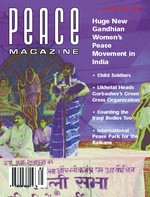
Peace Magazine Jan-Mar 2004, page 24. Some rights reserved.
Search for other articles by Nick Oliver here
Search for other articles by Nigel Young here
Nigel Young: Despite difficulties in obtaining safe passage from military authorities on two of four border crossings, 36 people from eight countries made a cross-border trek in July 2003. This was a step toward creating a transnational peace park for the Balkans. Nick Oliver's speech, below, was given at the post-trek NGO conference in Shkodra in northern Albania.
An international committee in Britain, along with local NGOs and environmentalists, has been developing the project for ten years. Two years ago Rose Swale Pope walked all around the potential park boundaries, which join three wilderness areas in Northern Albania, Western Kosovo, and Southeastern Montenegro. She crossed the borders despite snow and police hostility. The 2003 trek built on her courageous journey.
The transnational scheme aims to protect this truly magical high Alpine area -- the last mountain wilderness in Europe. There already exist three ill-defined formal national parks in the three contiguous regions. Only Albania is an autonomous national state; Montenegro and Kosova have an autonomous but ambiguous, even disputed, status. The involvement of Slavic Serbs is difficult, yet essential, for Belgrade claims much of the area and precious Orthodox monuments lie in the lowland valleys of the park. Although predominantly Albanian, the region is thinly populated and includes several ethnicities and three major religions -- Orthodox, Muslim, and Catholic. But with a declining rural population, the villages that survived war are under threat. However, ecological tourism and sustainable development, along with environmental protection, are the aims that can, through a formal park, save the region and the peace.
The local populations, especially in Albania, have become deeply attracted to the idea and a group have recently visited a national park in the UK and will potentially twin with it. International support is spreading, including North America and across Europe and other models of cross-border peace marks are being looked at in Chile, Norway, and Canada. Next year, further trans-frontier projects are planned -- including walks, exchanges, internships, joint preservation projects, and a monitoring conference in Montenegro on the edge of the park. Meanwhile, urgent tasks are continuing: improving trails and signs; funding the basic necessities such as roofing and water supplies; hiring school teachers and expanding mediation projects, as well as replanting woodlands, saving cultural monuments, and reconstructing bridges. All this gives hope for a future to the area and rebuilds links across these unique mountains that the eagle, the bears, the wolves, and the shepherds have long seen as a single home, unified by these majestic highlands.
Nick Oliver: There's tension in the very concept of a national park. On one hand, it should offer access to the public, while against other hand it should preserve the environment, which suggests keeping people out.
The concept of an international park contains further tensions: on the one hand, open access to the public, while on the other hand there are the demands of national security. Always borders have depended on restricting access. The Albanian border, particularly, was drawn specifically to use natural features -- unscalable peaks and ridges -- to separate the different nations and make it more difficult for each to invade the another. Surely a public's right to wander freely across international borders must endanger national security. Or does it?
I suggest that there is nothing paradoxical about an international wilderness park, to which the public have relatively unrestricted access, including across national borders; which conserves the natural environment and respects the sovereignty and security of all three national entities.
Consider the environment -- both natural and social. The area's unique ecosystem has already been recognized by all three sides of the borders. National parks are being developed in Kosova, Montenegro, and Albania. There are permanent villages and katuns (summer pasture huts). From the villages there is a drift to the cities and, every year, the herds of cattle at the katuns are fewer than the year before. There will be depopulation or there will be change.
A depopulated land is difficult to tend. It will become an impenetrable wilderness, preserving the flora and fauna at the cost of making them inaccessible. It will be difficult to mount a defence against the commercial pressure for the area to be exploited -- probably, in this case, for wood. A depopulated land is also good for cross-border criminal activity.
So there must be a permanent population in order to stabilize the ecosystem. And that population must have something to do. Industry is not going to come to this remote corner of any of the three countries. One solution involves changing the area from being three inaccessible corners of states into an area in its own right -- the centre of itself. And don't bring in industry. Bring in people who will be prepared to pay for all that is best in the areas -- the scenery, solitude, paths, villages, hospitality, traditions.
In this visit by 30 people over two weeks, some $15,000 has been brought into the local economies as payment for accommodation, food, guides, and local transport.
I'd like to see the three national entities create the park. It would show that security, in the middle of the Balkan region, does not consist of closed borders and separation between people, but of collaboration on projects that are in everyone's best interest.
I'd like to see a park that works -- with maps, booklets listing accommodations, restaurants, and places to buy food, even shown on a web site. This work could be done by the people living there. Elsewhere there could be bike and ski shops. These things would make me come back as a tourist and spend my money in one of the great scenic regions of the world.

Peace Magazine Jan-Mar 2004, page 24. Some rights reserved.
Search for other articles by Nick Oliver here
Search for other articles by Nigel Young here